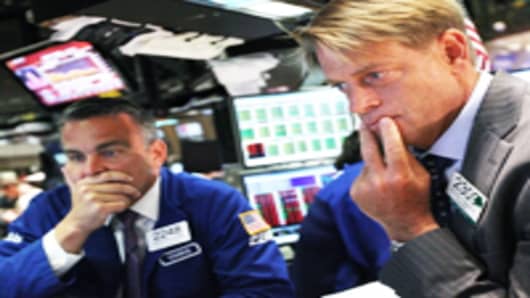Market pessimism is reaching a fever pitch, fueled by increasing belief that global policymakers either are powerless or inept when it comes to controlling the various headwinds confronting the economy.
With a bloody third quarter coming to an endand hopes that the final three months of the year will live up to their reputation as the market's best, now might be the time when confidence would be on an upswing.
But some of the market's top thinkers are releasing a chorus of dour predictions that, while allowing for the chance of a mild rally as 2011 closes, otherwise believe there is little reason for hope.
Bob Janjuah, the notably bearish fixed income analyst for Nomura Securities, believes that a market low is coming in October that could be followed by a late-year rise. But 2012 holds little but a bear-market roar that could take the Standard & Poor's 500 all the way down to the 700 range—a numbing 38 percent drop from current levels.
"The basic problems remain weak trend growth in the (developed market) world, which we think will continue for another three to five years, the policy errors (in our view) of the current set of policymakers, and the existing set of inadequate 'old world' policy institutions," Janjuah wrote in an analysis for clients.
As for investors in such a climate, Janjuah says they "should remain cautious, and focus on strong balance sheets and strong/robust business models."
Those types of comments are being echoed across the financial markets spectrum but perhaps most notably in recent days by the Economic Cycle Research Institute.
The ECRI is widely considered an impartial—and highly accurate—referee when it comes to discerning trends. At a similar point last year, when many also were anticipating another recession, the ECRI rebuffed those predictions.
For the months ahead, though, the ECRI's leading index is unwavering in its call for another recession , just two years after the last one officially ended. ECRI's head economist, Lakshman Achuthan, detailed the reasons for the coming recession in a CNBC appearance last week.
"It's important to understand that the recession doesn't mean a bad economy—we've had that for years now. It means an economy that keeps worsening because it's locked into a vicious cycle," ECRI said in research posted a few days ago. "Here's what ECRI's recession call really says: If you think this is a bad economy, you haven't seen anything yet."
Predictions for a bad economy, though, aren't really new.
Strategists such as David Rosenberg at Gluskin Sheff in Toronto have been pounding the table for months about another recession. He said Monday that only a decline in the savings rate has prevented one from happening already.
"We have to admit that we feel somewhat vindicated, having made this call nearly four months ago to howls of derision," Rosenberg said in his daily note Monday. "What we saw then and still see now is a full-fledged deleveraging cycle that has gone global."
For those who have intensified their negative outlooks, the conversion has much to do with a repeated inability of policymakers and politicians to come up with solutions to the European debt crisis as well as the jobs stagnation and other problems in the US.
"The various schemes for the European Financial Stability Facility are little more than a shell game to kick the debt can further down the road," Charles Biderman, CEO at the TrimTabs research firm, wrote. "How will shuffling the crappy debt of broke countries from broke banks into a leveraged 'special purpose vehicle' ultimately backed by the taxpayers of broke and nearly broke countries solve anything in the longer term?
"All it may do is postpone the reckoning and ensure an even bigger bust later."
TrimTabs is recommending investors be short the S&P 500 and financials in particular and go long consumer staples and industrials, while holding metals, commodities and inflation-protected bonds as well.
Such downbeat investor sentiment comes at a precarious time for a market facing conflicting historical trends.
The S&P 500 has averaged a 4.57 percent gain in the fourth quarter over the past 20 years, but that hasn't held up when the market has been negative heading into the end of the year. When the S&P 500 has been down for the first three quarters, as is the case this year, the index averages a 1.07 percent loss, according to Bespoke Investment Group.
Nick Colas, chief market strategist at CovergEx, called the quarter ahead the most important since the dark days of the financial crisis in 2008 and 2009, also citing failure from policymakers as the biggest concern.
"Political leadership is in short supply, as is consumer confidence," Colas wrote. "The former is necessary to address deficits in the US and euro zone stability. The latter is a missing precondition for sustainable growth."
And it's been that lack of growth potential that has continued to feed the bond market, pushing the benchmark 10-year note yield to record lowsand feeding a bid for safetythat doesn't bode well for stocks. Industrial metals, meanwhile, are caught in a steep selloff that also contributes to the recession sentiment.
"Despite the Fed buying, the 10-year has been unwavering in its signal for a meaningful slowdown," Quincy Krosby, market strategist at Prudential Financial, said in an interview. "The whole crisis during the summer—the downgrade, you name it—that 10-year has been saying, 'watch out.'"
Investors, then, are left to wait out a market that seems destined for a rough ride through increasing calls for recession.
"We hope to become manifestly, aggressively, stunningly bullish of equities," Dennis Gartman, hedge fund manager and author of The Gartman Letter, said in his Monday commentary. "Until then, we are sellers of rallies."




